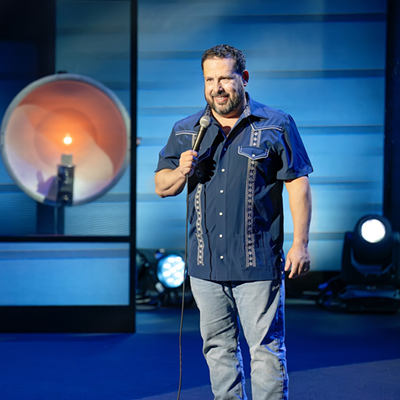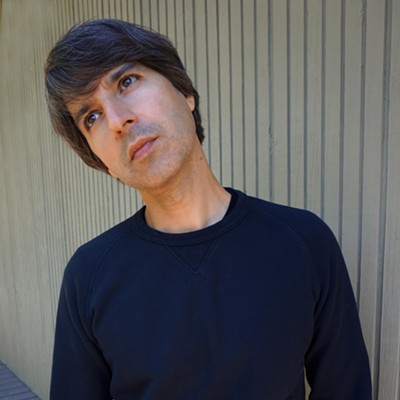HOUSE OF FOOLS. It's a tradition with Diaspora peoples in Europe to sing songs that start out sad and then explode with ecstatic glee somewhere in the middle of the tune.
This is how Eric Slabiak explains the music he and his brother Olivier perform with their band, Les Yeux Noirs.
"What gypsy people gave to the music is intensity, a heritage," he says. "It's in the songs. You just have to feel it. You're either laughing or crying or smiling. Sometimes all three at once."
The band, named for the title of a Russian gypsy tune made famous by Django Reinhardt in the '30s, is perfect for a French group that melds its music together by taking ingredients from a host of sources. From the Gypsy or Roma, it's a hodgepodge of music influenced by wandering peoples throughout Europe and the Middle East. From traditional Klezmer, you hear the telltale Jewish wedding music strain. Throw in a little Manouche Jazz, and it's tinged with the French-influenced gypsy music.
The group, who visited Tucson at Plaza Palomino's outdoor summer concert series last summer, arrives this week with their familiar mongrel musical style. The classically trained Slabiak brothers make magic with their frenetic, dueling violins and vocals while other band members fiddle with the accordion, double bass, cymbalum, drums and acoustic and electric guitars.
But all this classical training is merely one side of the all-male group dubbed the "Boy Band of a Lost Era." Says Slabiak of the Bangkok Post moniker, "I love this name. It's a good definition for us as our instrumentation is very traditional, very musical, but we make our music very pop and accessible.
"We were influenced at school and at home. The mixed cultural world affected us. It's important to play music of our roots but also of our choice. And that choice might be pop, jazz, even electronic."
Singing music in Yiddish--a language that's dying out with its older generation of speakers--Slabiak says, is a gift.
"It's like a souvenir from when I was a child. It's very intense for me to sing in the language of my parents and grandparents." And he adds, "My parents speak Yiddish when they need to be sweet. There's a lot of tenderness in that language."
And in the ballads the group sings, like Yiddishe Mame or Rozinkhes. For the 35-year-old Slabiak, what he sings and plays is tied up in history, both personal and political. "When my grandparents came to France from Russia and Poland, their kids--my parents--wanted only to speak French. It's not that they wanted to forget Yiddish, just the Polish or Russian languages.
"It's complicated for new generations to learn Yiddish. It wasn't the language of integration."
But the music is here to stay--and rejuvenated even. Slabiak says that gypsy music hails from many countries as people have moved around the globe.
"It's from Russia, Yugoslavia, Spain, Romania, Bulgaria. Everywhere the Roma went, they transformed the traditional and local music. At the end of the transformation, it's a singular music. One word defines it: folkloric."
Slabiak explains that part of the definition of gypsy music is its malleability. "You have to take liberty with it. We are free to re-play it, re-arrange it as it makes sense for us. This is really different from, say, classical music where you have much less freedom of arrangement."
What you get are strains of Eastern European gypsy music meeting up with what Slabiak calls "oriental influences"--music from the Ottoman Empire, with Arabian tinges, like the title track of the group's 2002 CD, Balamouk. Translated, it means "House of Fools."
"Listen to that track. The composition is more oriental, moody, somber. That's really different from more Klezmer-influenced music where you have wind instruments and maybe just one violin.
"Our style is less wedding music and more songs of the ghetto, songs of the poets. It's Eastern Europe at the beginning of the 20th century."
Slabiak grew up listening to classical and French music but also to gypsy and Yiddish music. His parents made sure to put the violin into his and his brother's hands at a very young age. But the conservatory followed one approach to playing the instrument.
"For me to play gypsy music, it has to sound a little dirty."
"Dirty" means unlearning some of that classical violin training.
The mix has contributed to Les Yeux Noirs' 10-year success. "If we want people to accept traditional music, we have to play it in a contemporary way."
The group is winding down its U.S. tour. From Tucson, they hop a half-dozen planes back to Paris. I asked Slabiak if he's encountered any "freedom" loving, anti-French Americans at any of his concerts.
"Just before coming to the States, a journalist told me that all the Americans are awful, that they've changed the name of french fries to freedom fries. But I've seen none of this. Maybe it's because we're musicians and we're here to make pleasure for our audiences.
Les Yeux Noirs performs one show in the Rhythm and Roots Concert Series on Saturday, May 10, at 8 p.m., at the Berger Performing Arts Center, 1200 W. Speedway Blvd. Reserved seats cost $22 in advance at Antigone Books, Brew & Vine, CD City and Enchanted Earthworks or online at www.dotucson.com. Or get them for $25 at the door.
Call for more information at 297-9133.
--Joan Schuman







